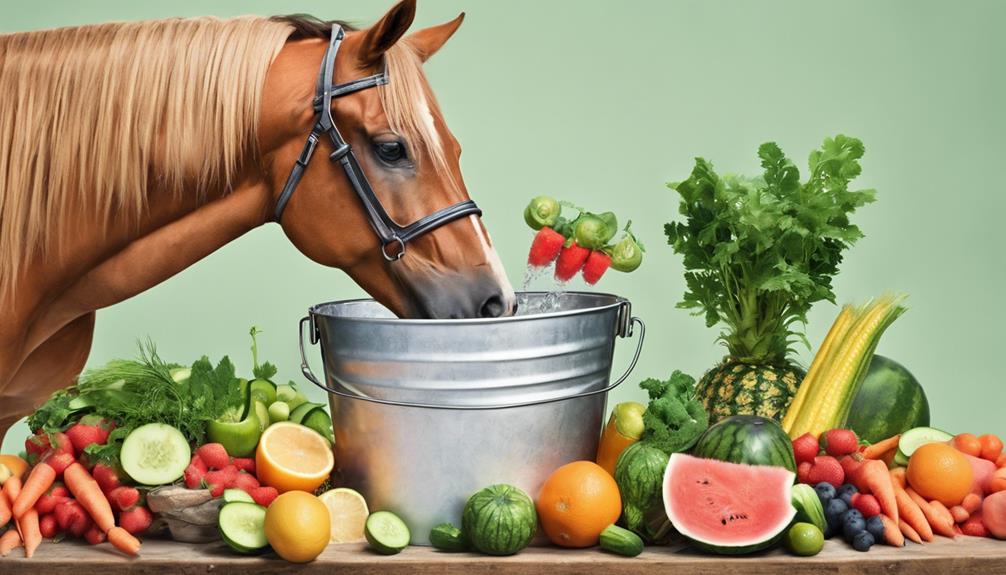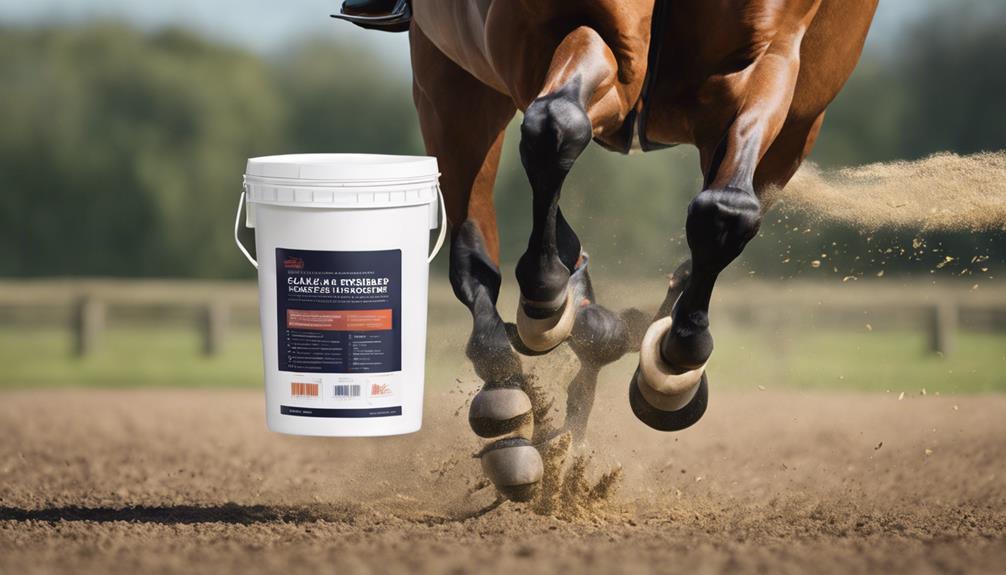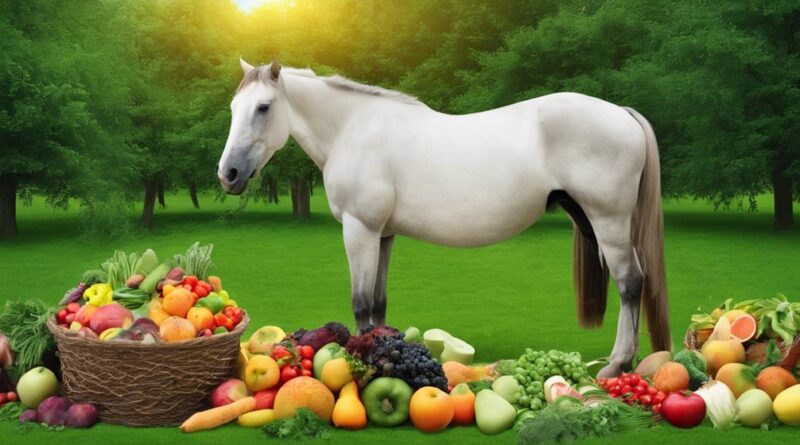Top Nutrition Strategies for High-Performance Horses
You might think feeding a high-performance horse is as simple as tossing some hay in a stall. However, when it comes to maximizing your equine athlete's potential, there are crucial nutrition strategies you can't afford to overlook.
From ensuring the right balance of essential nutrients to tailoring feeding plans for individual needs, the key to unlocking peak performance lies in the details.
Stay with us to uncover the top nutrition tips that will set your high-performance horse on the path to success.
Essential Nutrients for Performance Horses
When optimizing the nutrition of high-performance horses, ensuring they receive essential nutrients is crucial for their overall health and performance. Meeting vitamin requirements and mineral needs is fundamental to supporting the digestive health and immune function of these athletes. Vitamins such as A, D, E, and K are essential for various bodily functions in horses. Vitamin A is crucial for vision, immune function, and skin health, while Vitamin D is necessary for calcium absorption and bone health. Vitamin E acts as an antioxidant, protecting cells from damage, and Vitamin K is essential for blood clotting.
In addition to vitamins, minerals play a vital role in the well-being of high-performance horses. Minerals like calcium, phosphorus, magnesium, and potassium are essential for maintaining strong bones, muscle function, and nerve transmission. Calcium and phosphorus, for example, are crucial for bone density and growth in performance horses. Magnesium is essential for muscle function and energy production, while potassium helps regulate hydration and muscle contractions.
A balanced diet that meets the vitamin requirements and mineral needs of high-performance horses contributes significantly to their digestive health and immune function. Proper nutrition not only supports their daily activities but also enhances their overall performance and well-being. By ensuring they receive essential nutrients, you're setting them up for success in their athletic endeavors.
Balancing Protein Intake
To optimize the nutrition of high-performance horses, it's essential to carefully balance their protein intake to support muscle development and overall performance. Protein is a crucial component in a horse's diet as it plays a significant role in building and repairing muscle tissue, making it vital for the development of strong and healthy muscles essential for peak performance.
Protein requirements for high-performance horses vary depending on factors such as workload, age, and individual metabolism. As a general guideline, most high-performance horses require a diet consisting of around 10-12% protein. It's important to ensure that the protein sources in the horse's diet are of high quality and easily digestible to maximize muscle development.
When balancing protein intake for your high-performance horse, consider incorporating sources such as soybean meal, alfalfa, and high-quality grass hay. These sources are rich in essential amino acids necessary for muscle growth and repair. Monitoring your horse's protein intake and adjusting it according to their performance level and workload is crucial in maintaining optimal muscle health and overall performance.
Optimal Hydration Techniques

Ensuring proper hydration techniques is essential for maintaining peak performance in high-performance horses. Hydration techniques play a crucial role in the overall well-being and performance of your equine athlete. Adequate hydration not only helps prevent issues such as colic and heat stress but also directly impacts your horse's performance benefits.
To optimize hydration, always provide access to fresh, clean water. Horses should have water available at all times, especially during exercise or hot weather. Monitoring your horse's water intake and ensuring they consume enough is key to maintaining optimal hydration levels. Additionally, electrolyte balance plays a significant role in your horse's performance. Electrolytes are essential minerals like sodium, potassium, and chloride that help regulate fluid balance in the body. Imbalances in electrolytes can negatively impact performance, so it's important to supplement electrolytes as needed, especially during intense training or competition.
Implementing proper hydration techniques and maintaining electrolyte balance are vital aspects of your horse's care regimen. By prioritizing hydration and electrolyte balance, you can help your high-performance horse stay healthy, perform at their best, and reach their full potential. Remember, a well-hydrated horse is a happy and high-performing horse!
Importance of Electrolytes
A well-balanced intake of electrolytes is essential for maintaining peak performance in high-performance horses. Electrolyte supplementation plays a crucial role in ensuring that your horse remains at the top of its game by supporting proper hydration balance and overall physiological function.
Here are three key points to consider when it comes to the importance of electrolytes for your high-performance horse:
- Electrolyte Supplementation: High-performance horses have increased electrolyte requirements due to the amount of sweating that occurs during intense exercise. Electrolytes such as sodium, potassium, and chloride are lost through sweat and need to be replenished to maintain proper muscle function and hydration levels.
- Hydration Balance: Electrolytes work hand in hand with water to maintain hydration balance in your horse. Without adequate electrolytes, your horse may be at risk of dehydration, which can lead to decreased performance, muscle cramping, and other health issues. Ensuring your horse has access to both water and electrolytes is crucial for optimal performance.
- Performance Optimization: By providing your high-performance horse with the right balance of electrolytes, you can help optimize its performance and recovery. Electrolytes aid in muscle contraction, nerve function, and fluid balance, all of which are essential for horses engaged in rigorous physical activity. Proper electrolyte supplementation can make a significant difference in your horse's overall well-being and performance levels.
Energy Sources for Endurance
Maintaining peak performance in high-performance horses requires a deep understanding of the energy sources needed for endurance activities. When it comes to fueling your horse for optimal performance, two key factors come into play: carb loading for peak performance and fat utilization for endurance.
Carbohydrates are a crucial energy source for high-performance horses engaging in activities that require short bursts of intense effort. By strategically incorporating carb loading into your horse's diet, you can ensure that their glycogen stores are fully stocked, providing the necessary quick energy for explosive movements and sustained high-intensity performance. This is essential for activities like show jumping or dressage where power and agility are paramount for success.
On the other hand, fat utilization plays a significant role in supporting endurance activities in high-performance horses. During prolonged exertion, such as endurance races or long-distance rides, the body relies more on fat metabolism to sustain energy levels. By including healthy fats in your horse's diet, you can improve their endurance capacity by enhancing fat utilization efficiency, ultimately leading to better stamina and prolonged performance.
Balancing the intake of carbohydrates for peak performance and fats for endurance is key to optimizing your horse's energy sources for different types of activities. By tailoring their diet to meet these specific needs, you can ensure that your high-performance horse is primed for success in a variety of demanding disciplines.
Managing Gut Health
To optimize your high-performance horse's overall well-being and performance, prioritizing gut health is paramount. The digestive system plays a crucial role in your horse's ability to extract nutrients efficiently, impacting energy levels and overall performance.
Here are three essential tips to help you manage your horse's gut health effectively:
- Include Fiber-Rich Foods: Ensuring your horse's diet contains an adequate amount of fiber is key to maintaining a healthy gut. Fiber aids in digestion, promotes gut motility, and supports the growth of beneficial gut bacteria. Hay and grass are excellent sources of fiber that can help regulate your horse's digestive system and prevent issues such as colic.
- Probiotic Benefits: Incorporating probiotics into your horse's diet can have significant benefits for gut health. Probiotics are live microorganisms that promote a healthy balance of gut bacteria, improving digestion and nutrient absorption. Consider adding a probiotic supplement to your horse's feed to support gastrointestinal health, particularly during times of stress or when administering antibiotics.
- Monitor Fiber Content: Keep a close eye on your horse's fiber intake, ensuring they receive enough but not too much. Excessive fiber can lead to issues such as impaction colic, while too little fiber can disrupt the digestive process. Balance is key to maintaining optimal gut health and supporting your horse's performance.
Supplements for Joint Support

Ensure your high-performance horse's joint health with targeted supplements designed to support mobility and flexibility. Joint health is crucial for your horse's performance and overall well-being. Incorporating supplements for joint support can aid in preventing issues and maintaining optimal function. Natural remedies like glucosamine, chondroitin, and MSM are commonly used to promote joint health in horses. These supplements work by reducing inflammation, supporting cartilage repair, and improving joint lubrication, ultimately enhancing your horse's mobility and comfort.
Research findings suggest that supplementing with ingredients such as hyaluronic acid and omega-3 fatty acids can also benefit joint health in horses. Hyaluronic acid helps in maintaining joint lubrication and reducing inflammation, while omega-3 fatty acids have anti-inflammatory properties that support overall joint function. Staying updated on the latest trends in joint supplements is essential to provide your high-performance horse with the most effective support.
Tailoring Feeding Plans
Crafting a customized feeding plan is essential for optimizing the performance and health of your high-performance horse. When tailoring feeding plans, keep in mind the specific needs of your horse to ensure they receive the right balance of nutrients to support their demanding lifestyle.
Here are three key points to consider when customizing your horse's feeding plan:
- Customized diets: Every high-performance horse is unique, and their dietary requirements may vary based on factors such as age, workload, and any health conditions they may have. Consult with a professional equine nutritionist to create a customized diet that meets your horse's individual needs. By tailoring the diet to your horse's specific requirements, you can help them achieve their optimal performance levels.
- Performance optimization: The goal of a tailored feeding plan is to optimize your horse's performance. Ensure that the diet provides enough energy to fuel their workouts, adequate protein for muscle development and repair, and essential vitamins and minerals to support overall health. By fine-tuning their nutrition, you can enhance their stamina, agility, and overall performance in competitions.
- Consistent evaluation: Regularly monitor your horse's condition, performance, and overall well-being to assess the effectiveness of their feeding plan. Adjustments may be necessary based on changes in workload, season, or any signs of nutritional deficiencies. By staying vigilant and proactive, you can ensure that your high-performance horse receives the best possible nutrition for sustained success.
Frequently Asked Questions
Can High-Performance Horses Benefit From Incorporating Probiotics Into Their Diet to Support Gut Health?
Yes, high-performance horses can benefit from incorporating probiotics into their diet to support gut health. Probiotics help maintain a healthy balance of gut microbiota, crucial for optimal digestion and nutrient absorption. This can positively impact the horse's overall performance.
Including probiotics as a supplementation strategy can aid in promoting digestive health and supporting the horse's well-being during high-intensity activities.
Are There Specific Electrolyte Formulations That Are More Effective for Performance Horses Compared to Others?
When it comes to electrolyte benefits for high-performance horses, some formulations stand out for maximizing hydration and performance. Certain electrolyte blends are tailored to meet the specific needs of these horses during intense training and competition.
These formulations help replenish essential minerals lost through sweat, aiding in maintaining optimal hydration levels and supporting peak performance. Be sure to choose electrolytes that are well-suited for high-performance demands to ensure your horse excels.
How Can Owners Ensure Their High-Performance Horses Are Getting Enough Omega-3 Fatty Acids in Their Diet for Optimal Performance?
To ensure your high-performance horse gets enough omega-3 fatty acids for optimal performance, consider omega-3 supplementation. These healthy fats can support performance enhancement by aiding in inflammation control, joint health, and overall well-being.
Adding sources like flaxseed or fish oil to your horse's diet can help meet their omega-3 needs. Consult with your veterinarian or equine nutritionist to determine the best supplementation plan for your horse's specific requirements.
What Are Some Signs That a Performance Horse May Be Experiencing Muscle Fatigue Due to Inadequate Protein Intake?
If your performance horse is feeling muscle fatigue due to low protein intake, you might notice signs like decreased exercise performance and muscle cramping.
To help with recovery strategies, consider adding quality protein sources to their diet. This can aid in muscle repair and growth, improving overall performance.
Keep an eye out for these indicators to ensure your horse is getting the nutrition they need for peak performance.
Are There Any Specific Feeding Schedules or Timing Recommendations That Can Help Improve a Performance Horse's Energy Levels During Endurance Events?
To enhance your performance horse's energy levels during endurance events, it's crucial to establish proper feeding schedules and timing recommendations.
Consistency in when and what you feed your horse can make a significant difference in their stamina and endurance.
Creating a routine that aligns with your horse's training and competition schedule will help optimize their energy levels when they need it most.
Conclusion
In conclusion, ensuring your high-performance horse receives the proper nutrition is essential for their overall health and success.
By focusing on essential nutrients, balancing protein intake, staying hydrated, providing electrolytes, fueling with energy sources, maintaining gut health, and offering supplements for joint support, you can tailor a feeding plan that meets their specific needs and helps them perform at their best.
Remember, a well-fed horse is a happy and high-performing horse!
